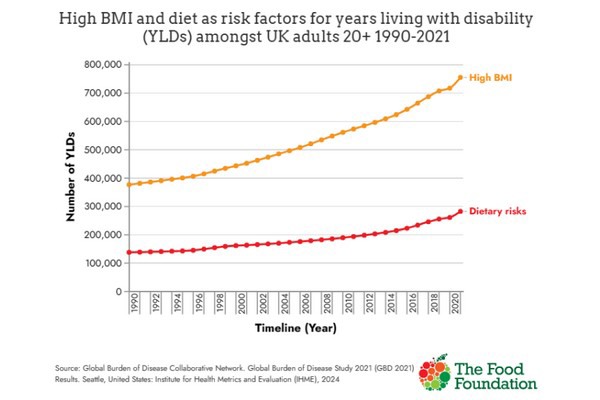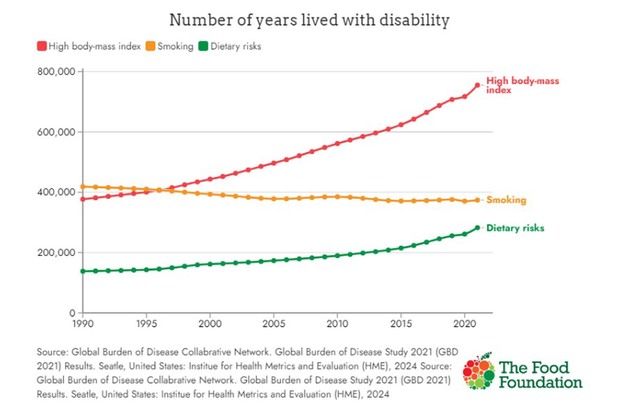Using data from the recently published Global Burden of Disease 2021 published by the Institute for Health Metrics and Evaluation, this report describes the years living with disability as well as deaths that result from high body mass index (overweight and obesity) and low or high consumption of specific foods. It also projects how these could be impacted if diets were to shift towards diets containing fewer foods high in fat, sugar and salt, less red/processed meat, and more fibre, fruit and vegetables.

- Obesity and overweight, or high Body Mass Index (BMI), is the leading risk factor for years living with disability (YLD) in the UK. It is also a major contributor to deaths in the UK.
- Obesity is linked to a number of serious health conditions which lead to chronic suffering and reduced quality of life. Type 2 diabetes, for example, has numerous complications including kidney disease and visual impairments. Excess weight causes stress on joints which can lead to chronic pain, respiratory problems which disrupt sleep, and can lead to psychological problems such as low self esteem and anxiety.
- High BMI was responsible for 755,212 years lived with disability in 2021 amongst adults aged 20+ in the UK.
- The number of years living with disability due to high BMI in the UK has increased by a third (32%) in the last decade, and has doubled since 1990 (see Figure 1).
- High BMI was also responsible for 39,872 deaths for adults aged 20+ in 2021, an increase of 13% in the last decade.
- In addition to BMI, other dietary risks (such as eating too little fruit and veg, and fibre, and too much processed and red meat and foods high in fat, sugar and salt) add further to years living with disability and deaths, and also feature in the top five risk factors overall. Death and disability from these other dietary risks have also risen sharply (by 46%) in the last decade.
- Furthermore, while YLDs from tobacco are declining, YLDs from high BMI now outnumber those from smoking and YLDs from dietary risks are rising fast.

Shifting the trajectory
Four dietary shifts were recommended as part of the National Food Strategy, published in 2021. These were a 30% increase in fruit and vegetables, 50% increase in fibre, a 25% reduction in high fat sugar and/or salt (HFSS) foods and 30% reduction in meat. At population level these shifts require small but significant changes in food options. The increase in fruit and veg, in volume terms, is equivalent to an apple a day, the increase in fibreto half a can of kidney beans, the decrease in HFSS food is equivalent to a third of a can of pringles and meat reduction equivalent to less than a single rasher of bacon.
Using the 2021 Global Burden of Disease data, The Food Foundation modelled the potential reduction in deaths and years living in poor health that could result from achieving these dietary shifts immediately, drawing on the relevant dietary risk factors reported on in GBD, as described below.
The available data does not allow a fully comprehensive account of the impact of these dietary shifts. It is important to note that the dietary shift on meat was only applied to red and processed meat consumption and the reduction in foods high in fat, sugar and or salt (HFSS) could only be applied to salt, sugary drinks and trans fatty acids. The model is likely to underestimate the true effects of the diet shifts for fibre and HFSS.
Based on this analysis, achieving these shifts could save approximately 6000 lives every year and reduce the total years living with disability by 28,857 every year. This represents a 10% reduction in both deaths and YLDs from dietary risk factors.
The top contributor to the reduction in YLDs seen was due to the shift away from red meat, along with reductions in processed meat, and increase in fruit and fibre. In the case of deaths, the top beneficial shift was that of fibre, along with a reduction in salt and increase in fruit.
To read the full report, click here.
For more information:
The Food Foundation
International House
6 Canterbury Crescent
London, SW9 7QD, United Kingdom
Tel: 0203 086 9953
Email: [email protected]
www.foodfoundation.org.uk










